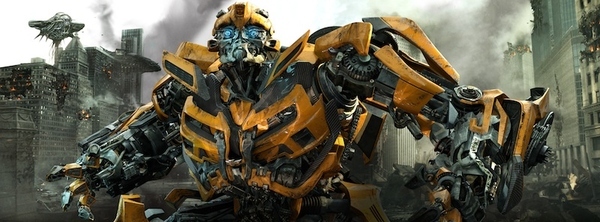'Transformers: Dark Of The Moon' Review
The phrases "ineffable soullessness" and "persistent moral idiocy" are used. And that's just in the first sentence. Looks like Michael Bay has another hit on his hands!
-

In this publicity image released by Paramount Pictures, Optimus Prime is shown in a scene from "Transformers: Dark of the Moon." (AP Photo/Paramount Pictures) By Michael Phillips, Chicago Tribune (AP)--"Transformers: Dark of the Moon," a work of ineffable soullessness and persistent moral idiocy, concludes with Chicago taking it in the shorts for 50-odd minutes, at the hands of the Decepticons in an alien takeover scored, partially, to an emo-ballad mourning the "cataclysm" of it all. In the original Greek, "cataclysm" means to "wash down," as in swill. In the third "Transformers" we learn via Ehren Kruger's screenplay that the NASA space program was a massive cover-up, allowing the crew of Apollo 11, among others, to explore the alien metal ruins on the moon's hidden dark side. We learn also that Shia LaBeouf's screaming intensity knows no human limits. He acts like a twisted, hyper-caffeinated rageaholic even when he's not confronting the enemy robots. He acts this way simply when he's nervous about his new girlfriend, played by Victoria's Secret undies model Rosie Huntington-Whiteley, spending time with her boss (Patrick Dempsey), whose office is played by the lovely and talented Santiago Calatrava-designed Milwaukee Art Museum. The Autobot robots from space, our pals, beat up on the Decepticons pretty hard in the Chicago climax. Rockets and other weapons disfigure various downtown buildings. The Wrigley Building gets off with just a scratch, thank God. Trump Tower, conspicuously a part of the plot, fares suspiciously well, considering the phrase "Trump Tower," when spoken aloud on-screen, sounds ripe for imminent ruination.
-
-
Director Michael Bay, master of the known universe when it comes to soul-crushing blockbusters with insidious worldwide appeal, manages a couple of pleasing, borderline-coherent bits. Notably, there's a scene full of queasy visual allusions to the World Trade Center towers and those who didn't make it where the nominal humans played by LaBeouf (whose character's personal Autobot bodyguard, Bumblebee, should be agitating for better material by now) and company slide down the glass exterior of a toppling office building. Down, down, down they go, like Leonardo and Kate at the end of "Titanic." The scene keeps going and going, and if Bay had any sense of honest thrill-making, it'd be honestly thrilling. He doesn't. He's merely relentless, working on your nerves in a purely clinical way, without the levitating touch of the dung poet you find, for example, in a Roland Emmerich film such as "2012." The plot has to do with the grand old man of the Autobot race, Sentinel Prime (voiced by Leonard Nimoy), returning to life and adjusting to Earth. A showdown ensues between the Deceps and the Autobots, and the planet Cybertron's survival hangs in the balance. Certain weaselly human/robot alliances make matters worse. The sacred head of the Lincoln statue in the Lincoln Memorial gets shot off by an especially unsympathetic Decep. Director Bay shoots the scene for maximum volume and minimum drama, his pet combination. Elsewhere a supporting character shares a men's room stall with LaBeouf's Sam and minutes later is tossed out the window to his death by a Decep. Bay hasn't a clue how to set the tone for this chain of events. It's funny? It's frightening? It's both? It's neither and both?
-

In this publicity image released by Paramount Pictures, Bumblebee is shown in a scene from "Transformers: Dark of the Moon." (AP Photo/Paramount Pictures) John Malkovich appears as Sam's tyrannical boss, who throws a fit because someone brings a red coffee mug onto an office floor decorated entirely in yellow. "It is a visual and therefore a visceral betrayal!" he screams, sounding, cutely, like Michael Bay, if Michael Bay could direct either dialogue or action. I admit to a certain sick fascination with how his brand of cynicism sells. The human element in "Transformers" means little. So does the metallic element. The line between the two grows blurry. Megan Fox, fired after the second "aneurysm-inducing" (LaBeouf's own description) installment in this franchise, has been replaced by Huntington-Whiteley, whose character is introduced in classic Bay fashion: rump first, ask questions later. Nice! The people expect it, just as Bay and company have conditioned the global "Transformers" audience to expect a fiercely reactionary worldview, rife with homophobia, xenophobia and enough drooling over weaponry to rival "Cars 2," to name another 3-D movie currently trying to make 3-D something special again. "So majestic and peaceful, this planet," Sentinel intones in one brief moment of calm, before getting back to the business of pushing toys. "Transformers: Dark of the Moon" exceeds the low expectations set by the previous outing, "Revenge of the Fallen," if only by a whisker. Both films serve primarily to make the first "Transformers" look like a classic. All three, taken together, which they should never be, appear designed to make your children more addled, volatile and, most dangerously, to make them less discerning consumers of summertime junk. Bay's hammering technique works, in a commercial sense. Executive producer Steven Spielberg is the richer for it. But it's telling to compare any good minute in Spielberg's "War of the Worlds," for example, with any of the 153 minutes in "Dark of the Moon." The former, which isn't even Spielberg at his best, offers the thrill and the uneasy, complicated spectacle of destruction you get from a first-rate entertainer. Bay's endless love of nastiness and chrome and aggression offers less. And that's the only "less" about it.
